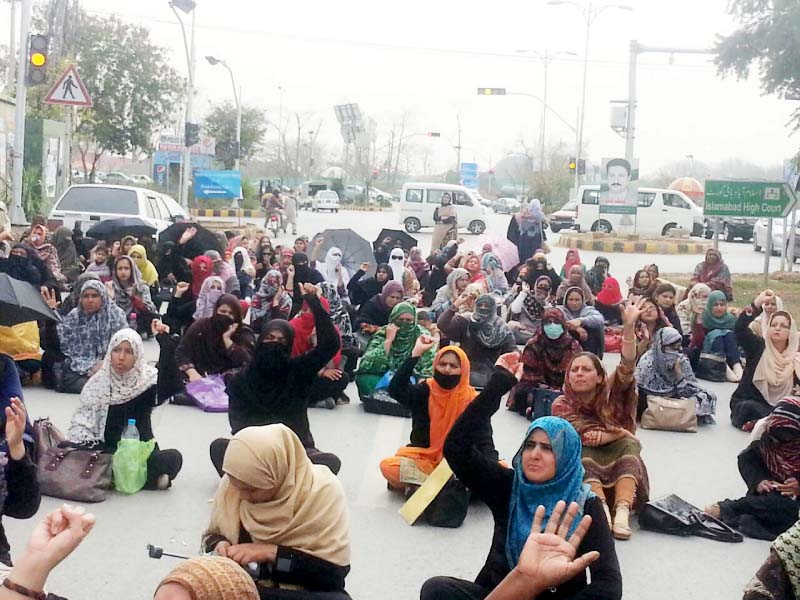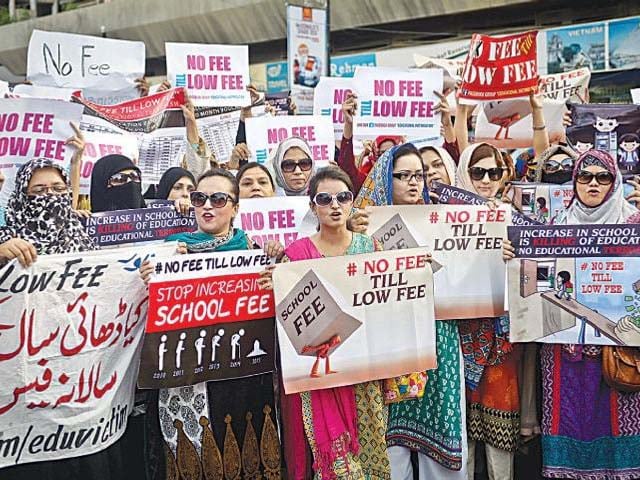
Modi’s visit to the US is not as warm as it looks
These anti-Modi sentiments were amply displayed in New York as the Sikh, Patel and Kashmiri groups heatedly protested.
From holding the title of the first person to be denied US visa and prohibited from entering US soil for nearly 10 years for his deliberate inaction in stopping the Gujarat massacre, Prime Minister Narendra Modi has certainly come a long way, judging by the warm welcome awarded by the Obama administration.
His previous record of being a ‘severe violator of religious freedom’ has been conveniently shrouded with diplomatic immunity as he conducts flurry of meetings with American statesmen, prominent Indian Americans, and heads of Fortune 500 companies and tech corporations.
Pakistani anchor Dr Shahid Masood hit the nail on the head when he compared Modi with an ‘item song model’ namely Rakhi Sawant; a lot of blaring hoopla with scant contribution towards actually advancing the plot or character development.
[embed width=“620”]]
However, although majority of Indian Americans are enjoying the ‘item song’, and are greeting Modi much like a pop-star, not everyone is willing to forgive and forget their Modi-based grievances. This includes many groups besides just the Kashmiri and Pakistani Americans, the latter’s feathers being particularly ruffled at present after the consistent Indian violation of the LoC and senior members of the Indian administration casually throwing antagonist remarks against Pakistan in their media.
These anti-Modi sentiments were amply displayed in New York as the Sikh, Patel and Kashmiri groups heatedly protested outside the United Nations (UN) headquarters. These protests continue to get more organised, and adrenalised, as Modi arrived in the Silicon Valley on September 26th. The tech capital of the world where technology churns out millionaires and billionaires, and quite possibly the linchpin of Modi’s entire US tour, is also where the protests are more affront and the protesters most outraged.
Although the SAP Centre in San Jose has a capacity of only 18,000 people, over 45,000 applied to get the free ticket to hear Modi speak on September 27th. If Modi measures his success by the number of these attendees, he would be wise to also measure his shortcomings by attending to the criticism of the opposition.
India remains unabashedly obstinate over the issue of Kashmir or addressing its ongoing underhanded tease-and-hide policy with Pakistan. Such tactics may be force of habit for India, but unless these festering grievances are redressed immediately, they could prove gangrenous to his rule. Modi policies, which have been described as being ‘authoritarian’ in nature by American academicians, were most suited to some bygone era. But in the 21st century, such polarised, draconian administrative strategies are akin to the iceberg that sank the Titanic. It is these very strategies that are at the crux of the current anti-Modi protests in the US.
Although estimated to run into thousands, the number of protesters is still less than the starry-eyed Modi supporters. However, their factually supported criticism is vociferous, vehement, and very clear as Modi continues his engagements to meet the heads and CEOs of tech giants like Facebook, Google, Tesla, Apple, Adobe etc. The Silicon Valley Modi protesters are a greater crowd than that in New York.
Outstanding among the organisations, activists and groups in the anti-Modi camp is the extremely organised #ModiFail campaign marshalled by the Alliance for Justice and Accountability (AJA). #ModiFail is open for free registration to anyone wishing to defend India’s religious minorities, marginalised groups and castes such as the Dalits, women, LGBT and free speech. It has also erected #ModiFail billboards on Bay Area highways. The billboards in Milpitas read,

In their protest, the #ModiFail event wishes to inform people of ‘the other side of the story’ and how Modi has used his prime ministerial status to whitewash his previous messes like Gujarat riots and how the ‘Silicon Valley PR tour is being used as an excuse to whitewash his dismal record’.
A press release of an AJA member group, Organisation for Minorities of India, states,
“Modi is a monster whose regime is typical of the pattern of Indian State rule for the past decades. Sikhs faced state-sponsored terror in 1984 under Congress and Muslims faced it in 2002 under BJP, while Christians and Dalits and other communities are routinely terrorised with impunity and state complicity. By the power of the Almighty, we will stand and speak truth to power on September 27.”
The Sikh for Justice Group was part of the protests held outside Facebook headquarters and outside the SAP centre as well. Their main argument focuses on the continuous worsening state of religious freedom for Indian citizens under Modi’s rule. They accuse him of forcibly attempting to turn India into a purely Hindu country by converting Christians and Muslims. The group also announced a reward of $10,000 for any attendee of the Facebook event with Modi and Mark Zuckerberg who would ask either of the two about Modi’s treatment of the Sikhs. In the words of Gurpatwant Pannun, the legal advisor of the group,
“We urge everyone to remind [Facebook CEO] Zuckerberg that hosting a known human rights violator runs counter to the core American value of upholding religious freedom.”
The section of the Patel community incensed over the police atrocities in Gujarat, raised black flags against Modi in New York and Bay Area. About 130 professors from major US universities including Harvard, USC, Columbia, and Stanford sent a joint, searing letter to Silicon Valley’s tech giants to stop their support for Modi’s Digital India initiative that seeks to create more tech jobs in India. Through Tech India, Modi wishes to expand internet access and create the required online capacity to boost government performance. However, the professors oppose this vehemently on grounds of inadequate privacy protections and violations of Indian citizen rights.
The tech angle aside, American professors’ letter is not only severely critical of Modi administration’s egregious past record of governance but also of present authoritarian streaks. This comprises of harassment of critics, shutting down of advocacy groups, and governmental interference with academic institutions, including entry denial of foreign scholars into India for conferences. The letter states,
“We urge those who lead Silicon Valley technology enterprises to be mindful of not violating their own codes of corporate responsibility when conducting business with a government which has, on several occasions already, demonstrated its disregard for human rights and civil liberties, as well as the autonomy of educational and cultural institutions.”
Elaborating further on the letter, Professor Thomas Blom Hansen of Stanford University called the Hindi Nationalist Movement greatly concerning.
“There are very deep and disturbing anti-democratic tendencies in that movement. Some of these tendencies are coming through in terms of a lack of respect for civil rights.”
Professor Arondekar of UC Santa Cruz criticises Digital India by reason of,
“Mr Modi’s intolerance of dissent, his poor record on freedom of expression in general, and on religious freedom in particular.”
Although the Silicon Valley protests, as the ones in New York, are confined to designated free speech areas, there is no stopping the protesters. This was demonstrated by Modi’s first ‘grand reception’ in New York, where Kashmiris, Sikhs, and the Patel groups freely used rotten tomatoes, eggs, and shoes to emphasise their point.
The point to ponder for Modi should also be that since such a protest could not have been held in India at all, it goes a long way to show how much his administration, not a keen supporter of free speech, still has to learn about democracy. If India claims to be a great democracy, it is only by reason of headcount.
Also, studying the emotions behind these resentments and unresolved grievances will lend the Modi administration an insight as to why there is scant chance of India being made the permanent member of the UN anytime in the near future. US statesmen are quite capable of awarding a warm welcome to the present prime minister of a rising global economy, but they will ponder deeply before offering it a position that can prove potentially perilous to whatever peace is left in the Southeast Asian region.
As for the Silicon Valley technology companies’ hearty hospitality, they are quite content to call the sheep a sheep for as long as the ‘sheep’ remains under diplomatic immunity. But it won’t be surprising to see Modi jilted for a new sweetheart should he ever show his wolf teeth and ears without such an immunity.
It is a wise politician who considers his dissenter a friend rather than a foe, since it is only through taking criticism that he is most often able to strengthen his policies and administrative strategies. On the other hand, he can, as Modi is choosing to do, bask in the glory of temporary spotlight, vainly boast India’s rising status in the tech field, and remain deliberately and arrogantly blind to the blistering ground reality in the region. Pride will get Modi nowhere and it’s high time he put a check on it.




COMMENTS (204)
Comments are moderated and generally will be posted if they are on-topic and not abusive.
For more information, please see our Comments FAQ